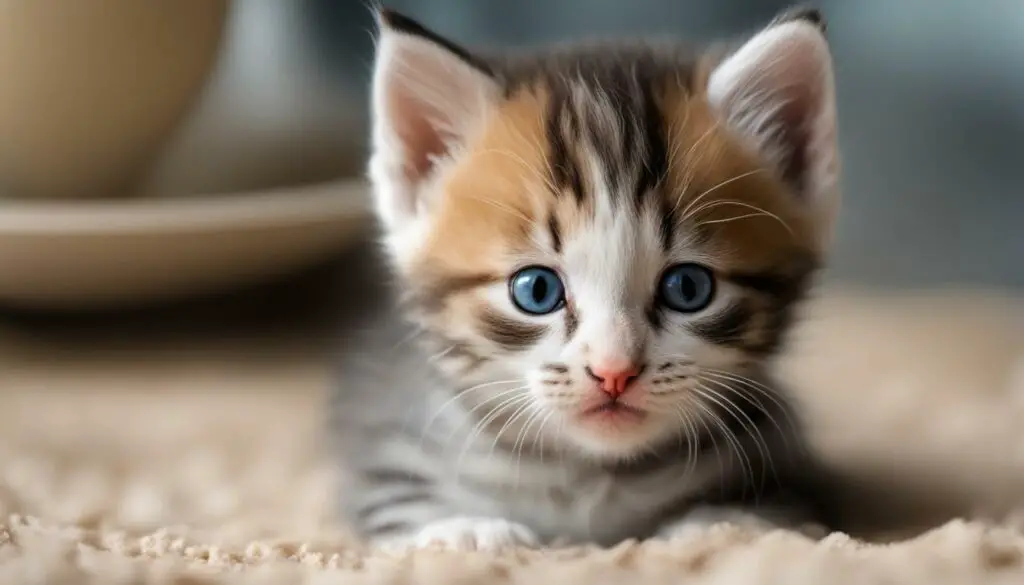As a responsible pet owner, the safety and well-being of your newborn kittens are of utmost importance. If you’re considering using diatomaceous earth (DE) as a natural remedy for flea control, it’s essential to understand its safety considerations. While DE is generally considered safe, there are precautions you should take to ensure the health and happiness of your kittens.
Before using DE on your newborn kittens, it’s crucial to choose a food-grade DE and avoid the inhalation of dust. Keep their noses away from the dust and apply it with caution. In this article, I will explore the safety aspects of using diatomaceous earth on newborn kittens and provide you with helpful tips for a safe and effective application.
Key Takeaways:
- Using food-grade diatomaceous earth is essential for the safety of newborn kittens.
- Avoid inhalation of the dust and keep the kittens’ noses away from it.
- Consult with a veterinarian for personalized advice on safe flea control methods.
- Create a safe and comfortable environment for your kittens.
- Regular veterinary check-ups are crucial for monitoring the health of your kittens.
The Benefits of Using Diatomaceous Earth for Kittens
When it comes to keeping kittens free from fleas and external parasites, diatomaceous earth (DE) can offer several benefits. DE is a natural remedy that works by dehydrating the exoskeleton of fleas, causing them to perish. Not only is DE effective in controlling fleas, but it is also non-toxic, making it a safe option for kittens.
One of the key advantages of using diatomaceous earth is its non-toxic nature. Unlike chemical-based flea control products, DE does not pose any harm to kittens if used correctly. This makes it especially appealing for pet owners who are concerned about exposing their kittens to harsh chemicals. Additionally, DE is easy to apply and does not require any complicated procedures or treatments.
Another benefit of using diatomaceous earth is its ability to prevent other external parasites, such as ticks. By applying DE on the kittens’ fur, it creates a barrier that repels ticks and prevents them from latching onto the kittens’ skin. This added protection against ticks can help keep the kittens safe from diseases that these parasites may transmit.
Overall, diatomaceous earth is a natural and effective option for controlling fleas and preventing other external parasites on kittens. Its non-toxic nature, ease of application, and added protection against ticks make it a popular choice among pet owners. However, it is important to remember the safety precautions when using DE on newborn kittens, such as using food-grade DE and avoiding inhalation of the dust.

| Benefits of Diatomaceous Earth for Kittens |
|---|
| Effective flea control |
| Non-toxic and safe for kittens |
| Prevents ticks and other external parasites |
Understanding the Safety Precautions for Diatomaceous Earth and Kittens
When using diatomaceous earth (DE) on kittens, it is essential to prioritize their safety. Here are some important safety precautions to keep in mind:
- Use food-grade DE: Ensure that the DE you use is food-grade, as other forms may contain additives that could be harmful to kittens.
- Avoid inhalation of the dust: DE can generate fine dust particles that can irritate the respiratory system. When applying DE, wear a mask to protect yourself and ensure the area is well-ventilated.
- Protect the kittens’ noses: It is crucial to avoid exposing the kittens’ noses to the dust. Inhalation of the dust can cause respiratory irritation. Keep the kittens away from the area where DE is being applied, and be cautious to prevent them from accidentally inhaling the dust.
By following these safety precautions, you can minimize any potential risks and ensure the well-being of your kittens when using diatomaceous earth for flea control.
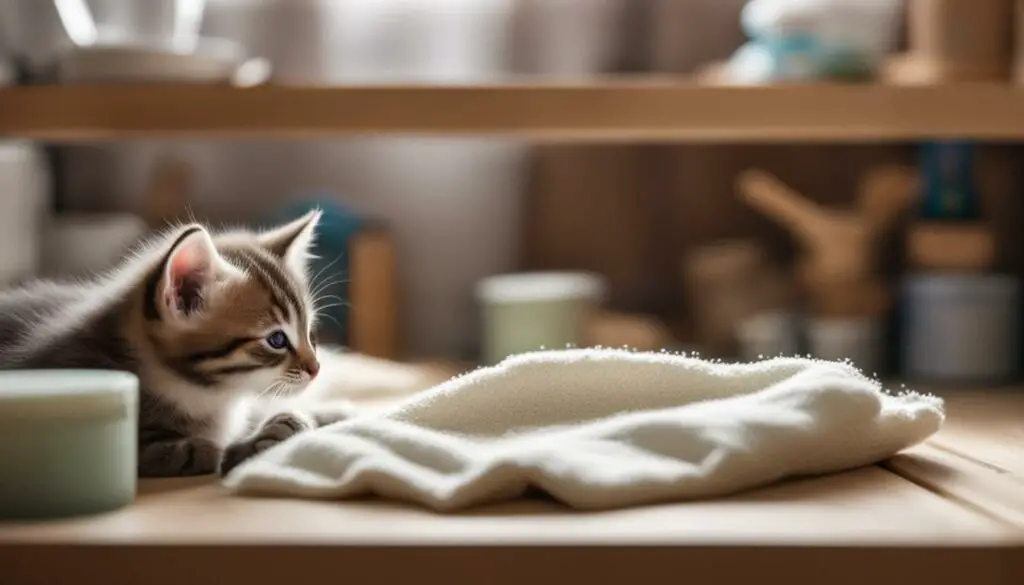
Additional Considerations for Kittens’ Safety
In addition to the specific safety precautions for using diatomaceous earth on kittens, it is important to consider their overall health and well-being. Here are some additional tips:
- Maintain proper nutrition: Providing a balanced diet is crucial for the kittens’ growth and development. Consult with a veterinarian to ensure they are receiving the necessary nutrients.
- Promote hygiene: Keep the kittens’ living area clean and sanitized to prevent the spread of parasites and diseases. Regularly clean their bedding and litter box.
- Monitor for signs of discomfort: Watch out for any signs of irritation or adverse reactions after applying DE. If you notice any unusual behavior or symptoms, consult with a veterinarian for guidance.
By taking these additional considerations into account, you can create a safe and comfortable environment for your kittens, promoting their overall health and well-being.
Alternatives to Diatomaceous Earth for Flea Control in Newborn Kittens
While diatomaceous earth is a popular natural remedy for flea control in newborn kittens, some pet owners may prefer to explore alternative options. Here are a few alternatives to consider:
1. Flea combs: A simple yet effective method, using a flea comb can help physically remove fleas from a kitten’s fur. Comb through their coat, paying close attention to areas where fleas commonly hide, such as the neck, ears, and tail.
2. Herbal flea sprays: Herbal flea sprays utilize natural ingredients like essential oils to repel and kill fleas. These sprays can be applied directly to the kitten’s fur, avoiding the face and sensitive areas.
3. Essential oil-based flea repellents: Some essential oils, such as lavender or cedarwood, have flea-repellent properties. Dilute a few drops of the chosen essential oil in a carrier oil and gently apply it to the kitten’s fur, taking care to avoid ingestion or contact with their eyes.
4. Consult with a veterinarian: It’s always best to consult with a veterinarian for guidance on safe flea control products for newborn kittens. They can recommend suitable alternatives based on the kitten’s age, health condition, and any specific concerns you may have.
Remember, each kitten is unique, and what works for one may not work for another. It’s essential to consider the individual needs of your kitten and choose a flea control method that is safe and effective for them.

The Importance of Regular Veterinary Check-ups for Kittens
Regular veterinary check-ups are essential for the health and well-being of kittens. These check-ups allow veterinarians to monitor the growth and development of newborn kittens, address any health concerns, and provide guidance on flea control and other important aspects of kitten care. By scheduling regular check-ups, pet owners can ensure that their kittens receive the necessary vaccinations and routine examinations to maintain optimal health.
During veterinary check-ups, kittens can receive vaccinations to protect them from common diseases. Vaccinations are crucial in preventing illnesses that can be life-threatening for young kittens. Additionally, the veterinarian will conduct a thorough examination to check for any signs of illness or abnormalities. Early detection of any health issues can lead to prompt treatment and a better prognosis.
In addition to vaccinations and examinations, veterinarians can provide valuable advice on flea control methods specifically tailored to kittens. Since kittens have unique needs and sensitivities, it is important to consult with a veterinarian before using any flea control products. A veterinarian can recommend safe and effective options that are suitable for newborn kittens, ensuring that they are protected from fleas without compromising their health.
Regular veterinary check-ups also provide an opportunity to discuss any concerns or questions regarding kitten care. This includes topics such as nutrition, behavior, socialization, and grooming. The veterinarian can offer guidance on providing a safe and comfortable environment for the kittens, as well as address any behavioral issues or concerns.
Table: Benefits of Regular Veterinary Check-ups for Kittens
| Benefits | Explanation |
|---|---|
| Early detection of health issues | Veterinarians can identify and treat any health problems before they worsen. |
| Vaccinations | Kittens receive important vaccinations to protect them from diseases. |
| Guidance on flea control | Veterinarians can recommend safe and effective flea control methods for kittens. |
| Expert advice on kitten care | Veterinarians can provide guidance on nutrition, behavior, socialization, and grooming. |
Regular veterinary check-ups are crucial for the overall health and well-being of kittens. By partnering with a veterinarian, pet owners can ensure that their kittens receive the necessary care and attention to thrive and lead happy, healthy lives.
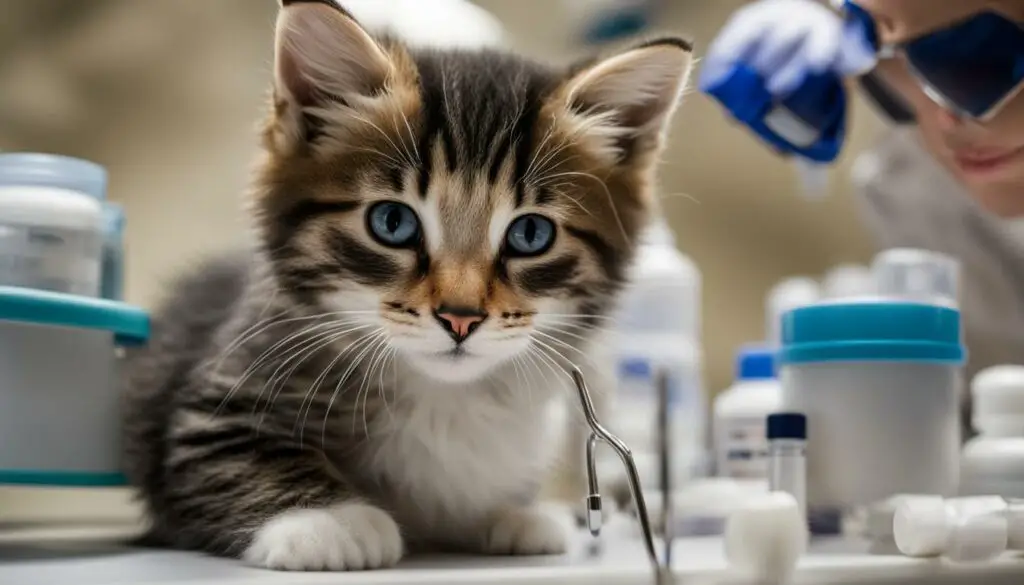
Tips for Safe Application of Diatomaceous Earth on Kittens
If you decide to use diatomaceous earth on newborn kittens, it is important to follow safe application techniques. Start by ensuring you are using food-grade DE and wearing a mask to avoid inhaling the dust. Lightly apply the DE to the kittens’ fur, avoiding the face and nose area. Gently massage the DE into the fur, making sure not to cause any discomfort to the kittens. Regularly check for any signs of irritation or adverse reactions after applying DE. Taking these precautions can help ensure the safe application of diatomaceous earth on kittens.
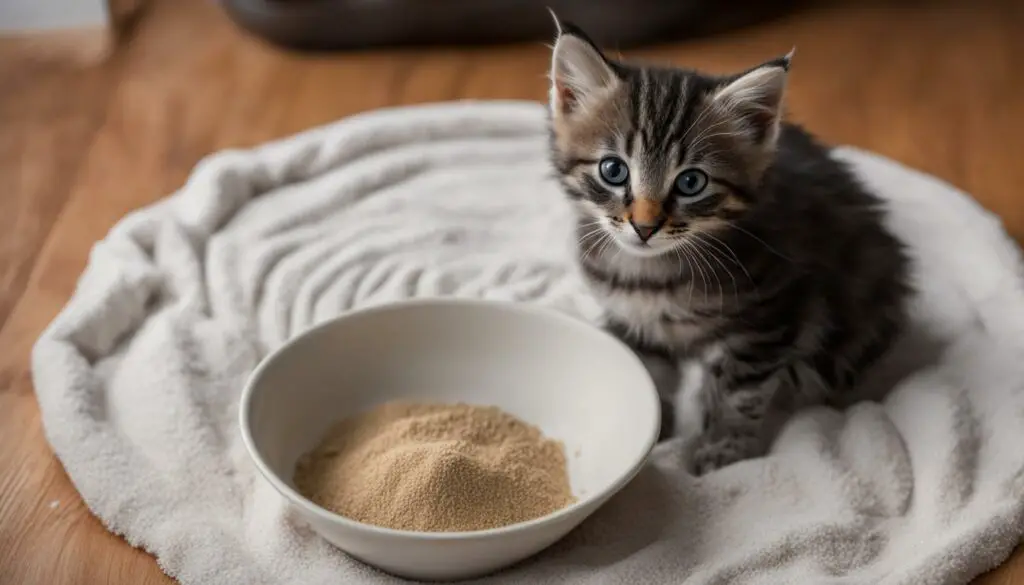
Additional Tips for Safe Application
- Use food-grade diatomaceous earth: Always opt for food-grade DE when using it on kittens. This ensures that there are no harmful additives that could potentially harm the kittens.
- Avoid the face and nose area: Be cautious when applying DE and make sure to avoid the face and nose area of the kittens to prevent any respiratory irritation.
- Massage gently: When applying DE to the fur, make sure to massage it gently to ensure that it is evenly distributed without causing any discomfort to the kittens.
- Monitor for any adverse reactions: After applying DE, regularly check the kittens for any signs of irritation or adverse reactions. If you notice any unusual symptoms, consult a veterinarian for further guidance.
By following these tips, you can safely apply diatomaceous earth on kittens and effectively control fleas without compromising their health and well-being.
Understanding the Different Grades of Diatomaceous Earth
When using diatomaceous earth (DE) for flea control in newborn kittens, it’s crucial to understand the different grades available. It is recommended to use food-grade DE, which is considered safe for consumption and external use in animals. Other grades, such as pool-grade DE, may contain crystalline silica, which can be harmful if ingested or inhaled. When purchasing DE, ensure that it is specifically labeled as food-grade to ensure the safety of your kittens and other animals.
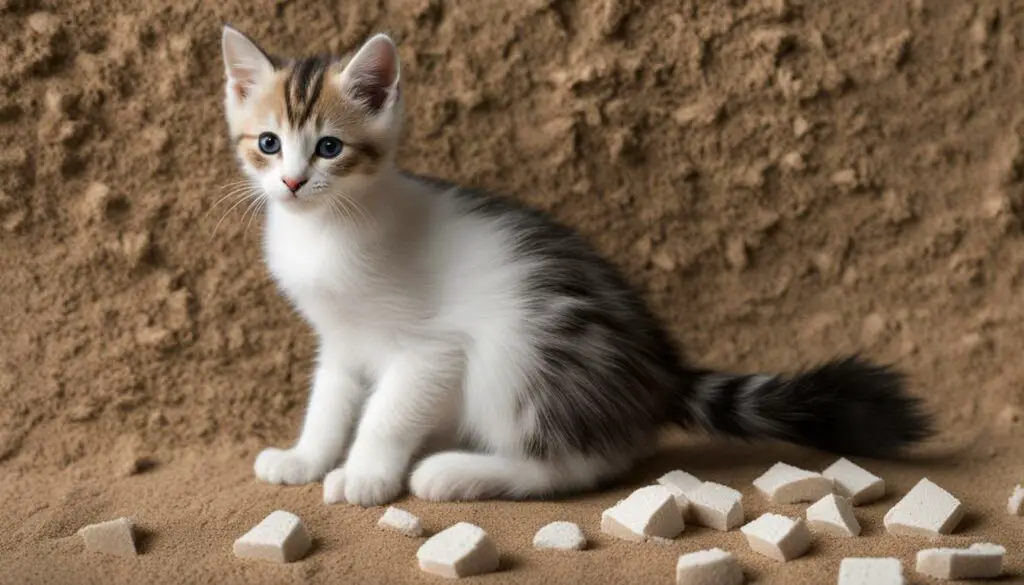
Why Food-Grade DE is Important for Kittens
Food-grade DE is processed differently than other grades of DE, making it safe for kittens and other animals. It undergoes a purification process to remove impurities and contains lower levels of crystalline silica. This makes it less likely to cause harm if accidentally consumed or inhaled by the kittens. By using food-grade DE, you can feel confident in your choice of flea control method for your newborn kittens.
| Grade | Uses | Safety Considerations |
|---|---|---|
| Food-grade DE | Flea control, internal parasite treatment, livestock feed additive | Considered safe for consumption and external use in animals |
| Pool-grade DE | Pool filtration | Contains higher levels of crystalline silica, which can be harmful if ingested or inhaled |
| Industrial-grade DE | Industrial applications, abrasive cleansers | Not suitable for use on animals |
By understanding the different grades of diatomaceous earth, you can make an informed decision when using it for flea control in newborn kittens. Always prioritize the safety of your kittens by choosing food-grade DE and following the recommended application techniques. Consult with a veterinarian for personalized advice on the best flea control methods for your kittens’ specific needs.
Additional Considerations When Using Diatomaceous Earth on Kittens
When using diatomaceous earth (DE) on newborn kittens, it is essential to consider other factors that can impact their health and well-being. While DE can be an effective and safe flea control method, it should be part of a comprehensive approach to kitten care. Here are a few additional considerations to keep in mind:
Proper Nutrition
Providing kittens with a balanced diet is crucial for their overall health. Good nutrition helps support their immune system, promotes healthy growth, and maintains their skin and coat health. Consult with a veterinarian to ensure you are feeding your kittens an appropriate diet for their age and specific nutritional needs.
Hygiene and Clean Environment
Maintaining a clean living environment is important for the well-being of newborn kittens. Regularly clean their bedding, litter box, and other areas they frequently occupy. This helps prevent the buildup of dirt, fleas, and other potential sources of infection. Use pet-safe cleaning products and ensure the living space is free from any hazards.
Socialization and Mental Stimulation
Kittens need socialization and mental stimulation to thrive. Provide them with opportunities to interact with humans and other animals in a safe and controlled environment. Offer toys, scratching posts, and playtime to keep them mentally and physically active. This helps prevent boredom and promotes their overall well-being.
By considering these additional factors and incorporating them into your kitten care routine, you can help ensure the health and happiness of your newborn kittens.
Consultation with a Veterinarian for Personalized Advice
When it comes to choosing safe flea control products for kittens, consulting with a veterinarian is crucial. Veterinarians have the knowledge and expertise to provide personalized advice based on the specific needs of your kittens. They can assess the kittens’ health conditions, age, and any other factors that may influence the choice of flea control method.
By consulting with a veterinarian, you can ensure that the flea control products you use on your kittens are safe and effective. A veterinarian can recommend suitable options that are gentle on young kittens and provide adequate protection against fleas. They can also guide you on proper application techniques and frequency of use.
Furthermore, veterinarians can address any concerns or questions you may have regarding flea control and overall kitten care. They can offer valuable insights into maintaining the health and well-being of your kittens and provide guidance on other aspects of their care, such as nutrition and vaccinations.
Remember, each kitten is unique, and their individual health conditions should be taken into consideration when choosing flea control products. Consulting with a veterinarian ensures that you are making informed decisions that prioritize the safety and well-being of your kittens.
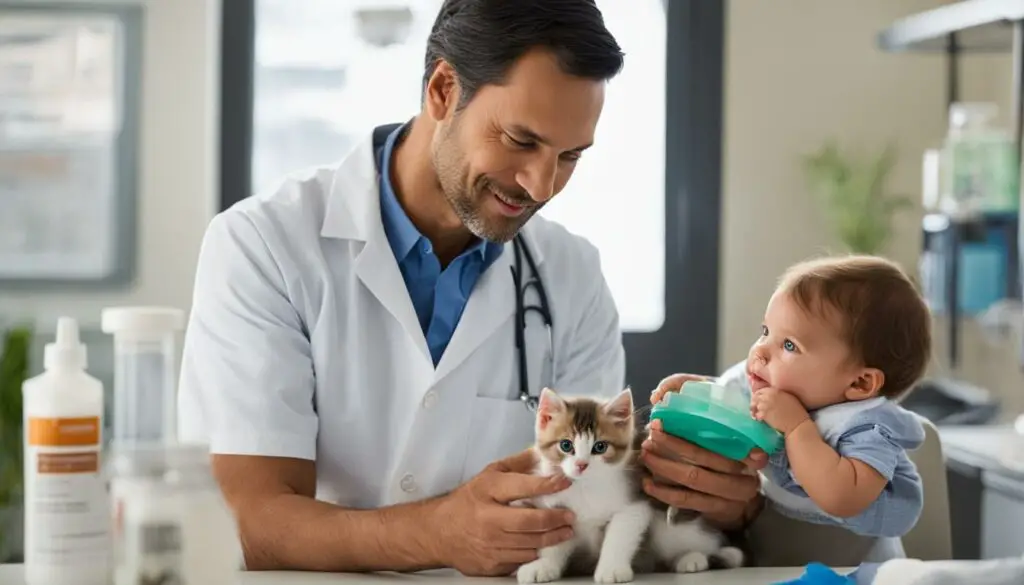
Summary:
- Consulting with a veterinarian is essential for choosing safe flea control products for kittens.
- Veterinarians can provide personalized advice based on the kittens’ health conditions and age.
- They can recommend suitable options that are gentle on young kittens and offer adequate protection against fleas.
- Veterinarians can address concerns, provide guidance on application techniques, and offer insights on overall kitten care.
- Each kitten is unique, and consulting with a veterinarian ensures informed decisions that prioritize their safety and well-being.
Flea Infestations in the Living Environment
If your kittens have been affected by flea infestations, it’s essential to address the issue not just on the kittens themselves but also in their living environment. Fleas can easily reproduce and thrive in carpets, bedding, and upholstery, so a comprehensive approach is necessary to eradicate them completely. By following a few simple steps, you can effectively manage flea infestations and minimize the risk of reinfestation.
Keeping the Living Space Clean
Regular vacuuming is crucial in controlling flea populations in your home. Focus on areas where your kittens spend the most time, such as their bedding and favorite resting spots. Be sure to empty the vacuum bag or canister promptly to prevent fleas from escaping. Washing the kittens’ bedding in hot water and regularly cleaning and sanitizing their living area can also help eliminate fleas and their eggs.
Additionally, consider using flea control products specifically designed for your home environment, such as sprays or powders that can be applied to carpets, upholstery, and other surfaces where fleas may hide. These products should be safe for kittens and effective in killing fleas and preventing their reproduction.
Treating Outdoor Areas
If your kittens have access to outdoor areas, it’s important to address fleas in those spaces as well. Fleas can be present in grass, soil, and other outdoor environments, creating a continuous source of infestation. Consider using flea control products specifically formulated for outdoor use, such as yard sprays or granules. These products can help eliminate fleas in outdoor areas and reduce the risk of reinfestation.
Consulting with a Veterinarian
If flea infestations persist despite your efforts, it may be beneficial to consult with a veterinarian. They can provide professional guidance on effective flea control methods, including specific products that are safe for kittens and the best practices for treating your living environment. A veterinarian can also assess the overall health of your kittens and provide any necessary treatments or medications to address flea-related issues.
By taking proactive measures to address flea infestations in the living environment, you can create a safer and more comfortable space for your kittens. Remember to implement regular cleaning routines, use appropriate flea control products, and seek professional advice when needed. With consistent effort, you can protect your kittens from the discomfort and health risks associated with fleas.

Monitoring Kittens for Signs of Flea Infestation
When it comes to caring for newborn kittens, it is crucial to be vigilant and monitor them for any signs of flea infestation. Fleas can cause discomfort, irritation, and even health issues for these delicate little creatures. By keeping a close eye on your kittens, you can detect and address flea problems early on, ensuring their comfort and well-being.
One of the most common signs of flea infestation is excessive scratching. If you notice that your kittens are scratching themselves more than usual, it could be a sign that fleas are present. You may also observe redness or irritation on their skin, particularly around the neck, ears, and base of the tail. Flea dirt, which looks like small black specks, may be visible on their fur or bedding.
Regular grooming sessions provide an excellent opportunity to monitor your kittens for fleas. Use a fine-toothed flea comb to comb through their fur, paying close attention to areas where fleas tend to hide, such as under the armpits and around the tail. If you spot any adult fleas or flea dirt on the comb, it is important to take immediate action to address the infestation.
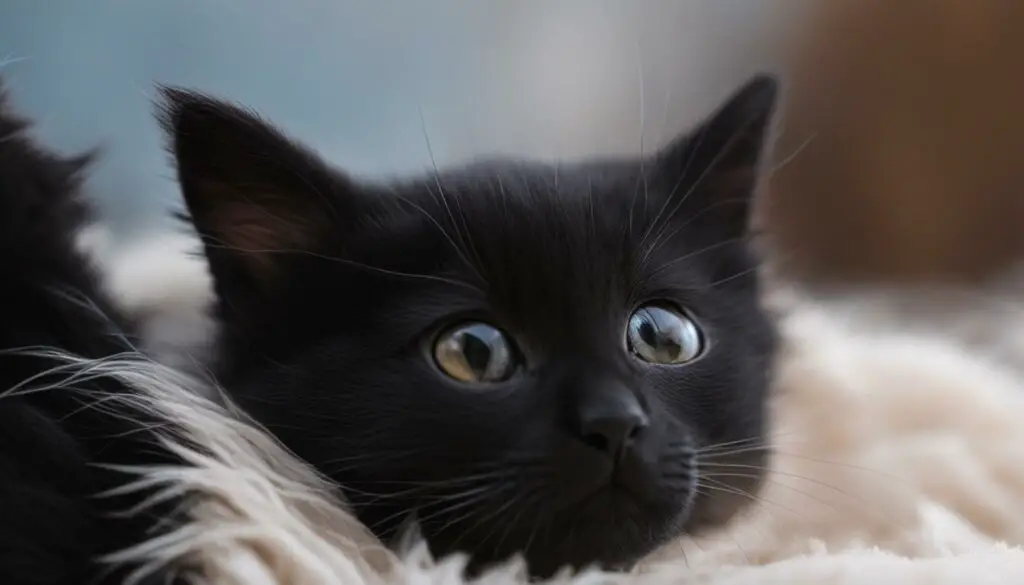 During the monitoring process, it is important to document any signs of flea infestation and share this information with your veterinarian. They can provide guidance on appropriate flea control methods and recommend safe and effective products for your kittens. Remember, early detection and prompt intervention are key to keeping your kittens flea-free and ensuring their overall well-being.
During the monitoring process, it is important to document any signs of flea infestation and share this information with your veterinarian. They can provide guidance on appropriate flea control methods and recommend safe and effective products for your kittens. Remember, early detection and prompt intervention are key to keeping your kittens flea-free and ensuring their overall well-being.
Tips for Creating a Safe and Comfortable Environment for Kittens
When it comes to caring for newborn kittens, creating a safe and comfortable environment is essential for their overall well-being. By taking a few simple precautions, you can ensure that your kittens feel secure and thrive in their surroundings.
Keeping the Space Clean and Sanitized
Regular cleaning and sanitization of the kittens’ living area is crucial to prevent the spread of germs and parasites. Use pet-friendly disinfectants and cleaners to maintain a clean environment. Pay special attention to litter boxes, bedding, and feeding areas, ensuring they are kept clean and fresh.
Providing a Warm and Cozy Resting Space
Newborn kittens need a warm and comfortable place to rest and sleep. Consider providing a designated nesting area with soft bedding, such as a cozy blanket or a heated pet bed. This will help keep the kittens warm and cozy, promoting their overall comfort and well-being.
Eliminating Potential Hazards
Remove any potential hazards from the kittens’ environment. Ensure that electrical cords are out of their reach and that toxic substances, such as cleaning products and houseplants, are safely stored away. Creating a kitten-proof space will help prevent accidents and keep your kittens safe.
| Hazard | Solution |
|---|---|
| Electrical cords | Keep cords out of reach or use cord covers |
| Toxic substances | Store cleaning products and houseplants away from kittens |
| Small objects | Remove small objects that kittens could swallow |
By following these tips, you can create a safe and comfortable environment for your kittens, ensuring their well-being and providing them with a nurturing space to grow and thrive.

Conclusion
In conclusion, diatomaceous earth (DE) can be a suitable and safe option for flea control in young kittens when used correctly. By following safety precautions, such as using food-grade DE and avoiding the inhalation of dust, you can ensure the well-being of your newborn kittens.
However, it is essential to consult with a veterinarian for personalized advice based on the kittens’ individual health conditions and age. A veterinarian can recommend safe and effective flea control products that are suitable for newborn kittens.
Remember, while DE can be an effective flea control method, it should be part of a comprehensive approach to kitten care. Providing a safe and comfortable living environment, regular veterinary check-ups, and maintaining good hygiene are crucial for the overall health and well-being of your kittens.
By prioritizing their safety and well-being and seeking professional advice, you can keep your young kittens healthy, happy, and free from fleas.
FAQ
Is diatomaceous earth safe for newborn kittens?
Yes, diatomaceous earth is generally safe for newborn kittens. However, it is important to use food-grade diatomaceous earth and avoid inhalation of the dust.
What are the benefits of using diatomaceous earth for kittens?
Diatomaceous earth is an effective natural remedy for flea control in kittens. It can also help prevent other external parasites, such as ticks.
What safety precautions should I take when using diatomaceous earth on kittens?
It is crucial to use food-grade diatomaceous earth and avoid exposing the kittens’ noses to the dust. Inhalation of the dust can cause respiratory irritation.
Are there alternatives to diatomaceous earth for flea control in newborn kittens?
Yes, there are alternative flea control methods for kittens, such as flea combs, herbal sprays, and essential oil-based repellents. Consult with a veterinarian for guidance.
How important are regular veterinary check-ups for kittens?
Regular veterinary check-ups are essential for monitoring the growth and development of newborn kittens and addressing any health issues. A veterinarian can provide guidance on flea control and overall kitten care.
What are some tips for safe application of diatomaceous earth on kittens?
When applying diatomaceous earth, use food-grade DE, wear a mask to avoid inhaling the dust, and avoid the kittens’ face and nose area. Regularly check for signs of irritation or adverse reactions.
What are the different grades of diatomaceous earth?
Diatomaceous earth comes in various grades. It is important to use food-grade DE for kittens, as other grades may contain harmful additives.
Are there any additional considerations when using diatomaceous earth on kittens?
Along with using diatomaceous earth, prioritize proper nutrition, hygiene, and socialization for newborn kittens. Consult with a veterinarian for personalized advice.
Should I consult with a veterinarian for advice on flea control for kittens?
Yes, consulting with a veterinarian is highly recommended for guidance on safe flea control products and methods suitable for kittens, considering their individual health conditions.
How can I address flea infestations in the living environment?
Regularly vacuuming, washing bedding, and treating the living space with appropriate flea control products can help address and prevent flea infestations in the environment.
How should I monitor kittens for signs of flea infestation?
Regularly check for flea dirt, excessive scratching, redness, or irritation on the kittens’ skin. If you suspect a flea infestation, consult with a veterinarian for appropriate flea control methods.
What are some tips for creating a safe and comfortable environment for kittens?
Provide a warm and cozy space for the kittens to rest and play, remove potential hazards and toxic substances, and maintain good hygiene by regularly cleaning and sanitizing their living area.
Is diatomaceous earth suitable for young kittens?
Diatomaceous earth can be a safe and effective option for flea control in newborn kittens when used correctly. However, it is important to consider other factors and consult with a veterinarian for personalized guidance.

